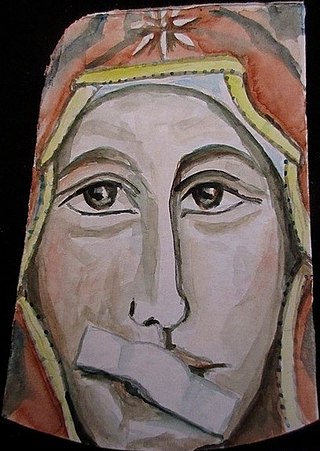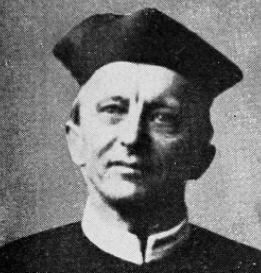
The Frauenfriedenskirche is a Roman Catholic church in Bockenheim (Germany). It was built by Hans Herkommer from 1927 to 1929, on a rise then known as Ginnheimer Höhe. The church is an unusual example of interwar modernist church architecture, combining elements of expressionism with the "New Objectivity" of Bauhaus architecture, and using monumental mosaics for external and internal decoration.

Kartellverband katholischer deutscher Studentenvereine is a German academic corporate association with ninety member corporations in Germany, Austria, [Belgium], and Switzerland. It was incorporated November 29, 1865. As of February 2008, the Alliance represents 16,000 students in Germany alone.

Christine Teusch was a German politician of the Zentrumspartei and the Christian Democratic Union.

Ellen Aurora Ammann was a German politician and activist of Swedish origin, a representative of the Bavarian People's Party.
Ida Raming is a German author, teacher and theologian.
Women in Switzerland gained the right to vote in federal elections after a referendum in February 1971. The first federal vote in which women were able to participate was the 31 October 1971 election of the Federal Assembly. However it was not until a 1990 decision by the Federal Supreme Court of Switzerland that women gained full voting rights in the final Swiss canton of Appenzell Innerrhoden.
The League of Jewish Women in Germany was founded in 1904 by Bertha Pappenheim. Pappenheim led the JFB throughout the first twenty years of its existence, and remained active in it until her death in 1936. The JFB became increasingly popular through the 20th century. At its peak in 1928, the organization had 50,000 members from 34 local branches and 430 subsidiary groups. At the time, the JFB was Germany's third largest Jewish organization, with 15–20% of Jewish women in Germany becoming members.
The "Katholische junge Gemeinde" is a major German Catholic youth organization. KjG has a democratic structure and local groups throughout Germany, mainly in Catholic parishes, with a total of about 80,000 members. The KjG is a member of the Catholic umbrella of youth organizations, Fimcap, and the German umbrella of Catholic youth organizations, BDKJ.
The Roman Catholic Deanery of Munich Perlach (German: "Dekanat München-Perlach") is a deanery of the Roman Catholic Church in the Archdiocese of Munich and Freising. At the moment, eight parishes belong to the deanery and there are currently c.48,000 Catholics living in the deanery, which roughly encompasses the area of district number 16 of the City of Munich, "Ramersdorf-Perlach" and the area of the municipality Neubiberg, south-east of Munich. The diocesan agenda for structural reorganization regrouped the eight parishes as three pastoral unions and the borough parish ("Stadtteilkirche") of Neuperlach. The new common patronage of "Christ the Redeemer") fused five previously independent parishes. The Dean is Christian Penzkofer and the Sub-Dean is Bodo Windolf.

Catholic Social Academy of Austria was established by the Austrian Catholic Bishops' Conference in 1958 with its seat in Vienna, Austria. Its mission is to "research, mediate, and convey the use of Catholic social teaching in practice" and it does this mainly through social analysis, political adult education, and organizational development.
Albertine Badenberg was a teacher and a feminist activist. She later became involved with mainstream politics, sitting as a member of the Prussian parliament ("Landtag") between 1924 and its abolition in 1933.

Pax-Bank eG is a German bank that focuses on Christian finance headquartered in Cologne. The bank states that it is a German: Bank für Kirche und Caritas, a cooperative Catholic universal bank. Its members consist of institutions of the Catholic Church and private individuals from the clerical field. The bank was founded as a self-help organization by and for priests in 1917 in Cologne.
The Rhenish women's league was an organisation set up by the Rheinische Volkspflege to bring together various primarily middle class women's organisations initially to campaign against the use of African troops by the French Army in the occupation of the Rhineland. The idea was initiated by a member of the Cologne-based Neven du Mont family and taken up by the civil servant Margarete Gärtner, who organised the first conference in Frankfurt am Main, 23–24 June 1920. The conference ratified her as the leader.

Mary 2.0 is a heterodox movement by Roman Catholic women in Germany to raise awareness of sexism, the mishandling of sexual abuse scandals, and other issues within the Catholic Church.

Maria Schmitz was a German teacher, a persistent campaigner for women's education, and a politician of the Catholic Centre Party. She served as a member of the Weimar National Assembly ("pre-parliament"), convened to agree a post-imperial German constitution, during 1919/1920.
Marie Zettler was a German politician and commentator/journalist. A member of the Catholic-centrist Bavarian People's Party , and with women now permitted to stand for election, in 1919 she became one of a number of women elected to what became known as the Weimar National Assembly, mandated to draw up a republican constitution for a newly post-imperial Germany. She also served, for more than forty years, as Secretary for Bavaria of the German Catholic Women's Association.

Augustin Rösler, C.Ss.R. was a Prussian theologian and sociologist, and a Redemptorist priest, who wrote both on the history of Christianity and contemporary issues. His best known work is Die Frauenfrage vom Standpunkte der Natur, der Geschichte und der Offenbarung, a treatise on the woman question published in 1893.

The National Council of German Women's Organizations – German Women's Lobby is a German umbrella organization for organizations concerned with women's rights and gender equality. One of Europe's largest women's organizations, it includes 62 member organizations with 11 million members.

Marita Loersch was a German-French charitable worker, and founding member of several Catholic women's associations.
Emilie Hopmann was a German social worker. She was awarded the Pro Ecclesia et Pontifice, by Pope Pius X in 1910 .












